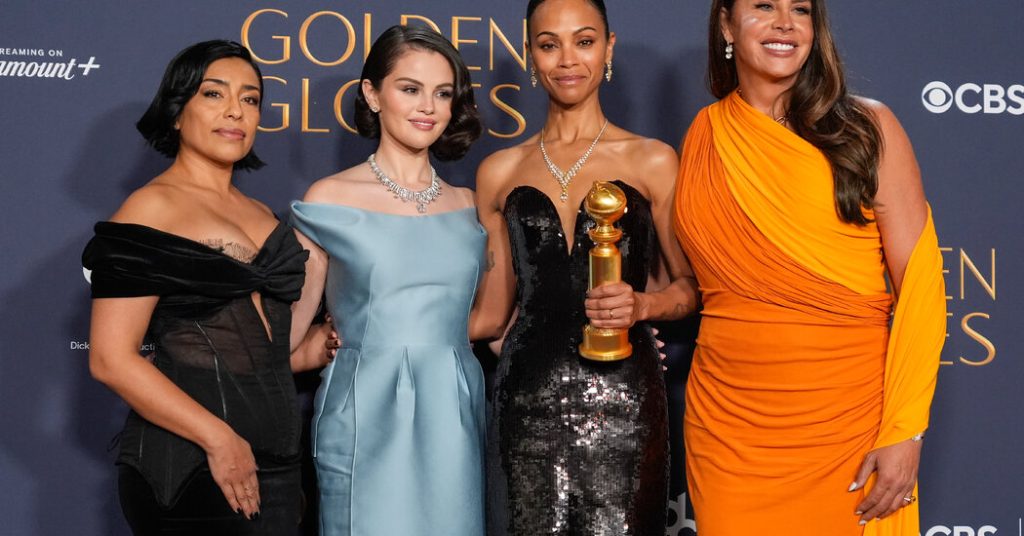The 82nd Golden Globe Awards, held against the backdrop of a politically charged environment with Donald Trump’s second term, marked a significant departure from the overtly political stance Hollywood typically embraces. While the awarded films, like “Emilia Perez” and “The Brutalist,” touched on themes of trans identity and immigrant struggles, the overall tone of the ceremony was noticeably subdued, devoid of the fiery political rhetoric that characterized previous years. This apparent retreat from the culture wars, described by some as raising a white flag, sparked debate within Hollywood itself, with some defending the choice of films as a subtle form of resistance while others lamented the absence of more direct political commentary.
The contrast with prior Golden Globe ceremonies was stark. In recent years, the event had served as a platform for prominent figures to voice their opposition to Trump and his policies. Meryl Streep’s scathing critique of the then-president-elect in 2017 set the stage for subsequent years of impassioned speeches on issues ranging from sexual harassment and the Time’s Up movement to abortion rights, climate change, Black Lives Matter, and the war in Ukraine. The 2024 ceremony, however, saw a marked shift, with celebrities largely refraining from political commentary and instead focusing on lighter fare.
This shift in tone extended from the red carpet pre-show, where hosts emphasized positivity and light-hearted banter, to the main event itself. Comedian Nikki Glaser’s opening monologue included a brief, albeit tempered, joke about Trump’s reelection, followed by a swift change of subject. Karla Sofía Gascón’s acceptance speech for “Emilia Perez” offered a moment of political resonance, advocating for trans rights, but remained an outlier in an otherwise apolitical evening. This noticeable absence of political pronouncements raised questions about Hollywood’s strategy in navigating the increasingly polarized political landscape.
Several factors likely contributed to Hollywood’s toned-down approach. Firstly, the entertainment industry, like much of the country, appeared to be grappling with how to effectively engage with a second Trump administration. The shock of his reelection seemed to have prompted a period of reflection and reassessment of strategies for political engagement. Secondly, a perceptible shift towards the right within Hollywood itself may have played a role. In an effort to broaden appeal and avoid alienating segments of the audience, some studios and networks had begun to temper overtly progressive themes in their programming, a trend reflected in the selection of more politically neutral content.
A key incident highlighting the potential risks of outspoken political stances was the case of Rachel Zegler, the star of Disney’s live-action “Snow White.” Zegler’s harsh criticism of Trump and his supporters on social media sparked a significant backlash, forcing her to issue a public apology. This episode served as a cautionary tale for many in Hollywood, reinforcing the potential for negative consequences and career damage associated with taking public stances against the former president. This incident likely contributed to the advice given by some publicists and agents to their clients to avoid political commentary during the Globes.
Finally, and perhaps most significantly, the decision to steer clear of politics may have been influenced by audience research. Data from Nielsen and other sources suggests that viewers tend to react negatively to overtly political pronouncements during awards shows. Minute-by-minute viewership analysis reportedly indicates a significant drop-off in audience engagement when celebrities use the platform to express political opinions. This aversion to political grandstanding likely played a considerable role in the muted tone of the 2024 Golden Globes. The event seemed to hark back to an earlier era in Hollywood when stars prioritized entertainment and charm, carefully avoiding anything that might alienate potential viewers. This marked a clear departure from the recent trend of using awards shows as a platform for political activism, a shift likely driven by a combination of strategic recalibration, audience preferences, and a desire to avoid further polarizing an already divided nation.


